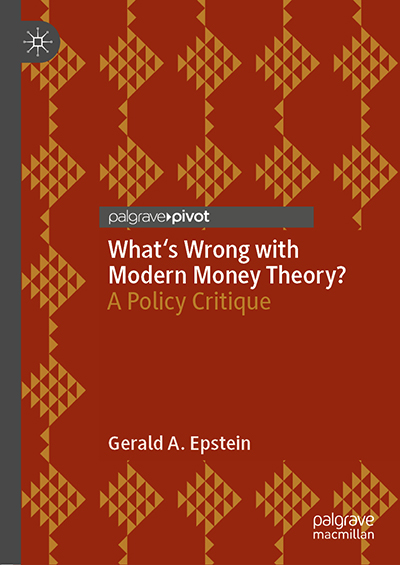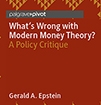Buy book from Palgrave Macmillan
>> Read review by Makoto Itoh, Professor Emeritus of the University of Tokyo
>> Read author's commentary found on Institute for New Economic Thinking
>> Listen to podcast about the book hosted by New Books Network
>> Read original Working Paper
 Modern Money Theory (MMT) has attracted a great deal of attention and a large number of adherents in recent years. Also sometimes called Modern Monetary Theory, the doctrine's appeal has largely come from its argument that governments that issue their own "sovereign currencies" do not have to pay for government expenditures -- their central banks can simply create money. What's Wrong With Modern Money Theory critiques this doctrine's monetary and fiscal policy proposals based on their limited applicability, their possible dangers for developing countries, the advocates' lack of attention to empirical evidence, and the problematic political message it sends to progressives, among other issues.
Modern Money Theory (MMT) has attracted a great deal of attention and a large number of adherents in recent years. Also sometimes called Modern Monetary Theory, the doctrine's appeal has largely come from its argument that governments that issue their own "sovereign currencies" do not have to pay for government expenditures -- their central banks can simply create money. What's Wrong With Modern Money Theory critiques this doctrine's monetary and fiscal policy proposals based on their limited applicability, their possible dangers for developing countries, the advocates' lack of attention to empirical evidence, and the problematic political message it sends to progressives, among other issues.
Reviews
"Gerald Epstein is a leading thinker in the political economy of monetary policy and central banking. His approach emphasizes the significance of interests and institutional arrangements. This book provides a critique of MMT and its claim that sovereign governments are financially unconstrained. It shows how institutional arrangements differentially constrain governments, giving rise to a financial standing hierarchy that MMT overlooks and neglects. The book makes an important novel contribution, adding to existing macroeconomic critiques of MMT.”
—Thomas Palley, Co-editor, Review of Keynesian Economics
"This book is an important contribution to the debate on monetary theory and policy. It considers a wide range of problems of MMT and raises pertinent concerns about the applicability of its policy. Based on an extensive knowledge of the literature and of contemporary monetary history, the book underscores the failure of MMT to describe the complex working of the financial system. Readers can enormously benefit from this book."
—Carlo Panico, Professor of Economics, National Autonomous, University of Mexico
“Jerry Epstein takes no prisoners in his essential guide to Modern Monetary Theory. His examination of the international dimensions of the approach and its implications for non-key currency countries raise vital issues that often receive little attention by both proponents and critics."
—Ilene Grabel, Distinguished University Professor, University of Denver



